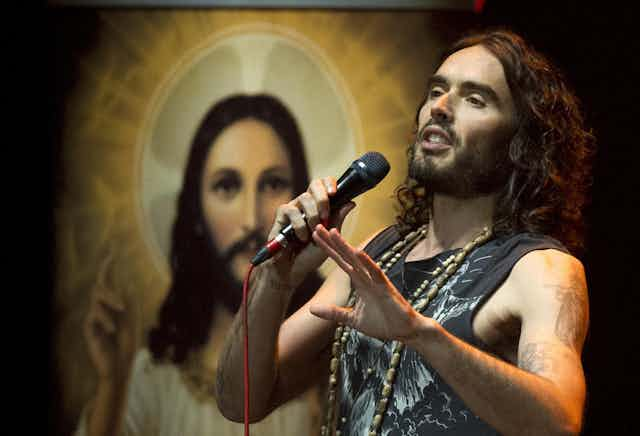Over the last ten years I have been researching the barriers to women’s participation in the UK comedy circuit. During that time, it became clear to me that the live comedy industry has a particular susceptibility to fostering spaces of abuse.
Recent allegations against comedian Russell Brand were published by The Sunday Times, The Times and Channel 4’s Dispatches. Brand has denied the allegations in a video posted to his Instagram account.
Much discussion about the allegations has highlighted the possibility that celebrity status can be leveraged to abuse and silence women. There has not been as much attention, however, to the way Brand’s persona as a comedian and the specifics of the comedy industry may have influenced events.
The live comedy industry (as with many creative industries) employs a huge number of precarious freelancers. It is therefore sadly unsurprising that power imbalances exist between comedy bookers, producers or household-name talent and those starting out on the circuit.
Comedy as an industry, both in its live and media forms, continues to be male dominated and so these power imbalances are gendered. Women and non-binary comedians encounter sexually abusive behaviour and misogyny on the circuit with startling regularity.
But there’s something that can make the industry a particularly toxic environment: the comedy itself. The interactions baked into the live comedy industry (both on and off stage) make it simultaneously easier for those in power (mostly men) to obscure sexually aggressive behaviour and misogyny, and harder for women to speak up against it.
The only woman
Until relatively recently, women comedians – when included at all – worked alone on comedy bills. All-male lineups have been prevalent since the Working Men’s Clubs of the 1960s and still cling on in some spaces today.
When women were booked they were there as the “only woman” and were therefore unfairly placed in a position of representing an entire gender. The reasons for this lack of opportunity are linked to stereotypical views about women and humour, such as: “women aren’t funny”, “only women are interested in comedy performed by women”, “all women comics talk about the same things” and so on.
Working in isolation makes women more vulnerable to exploitation and prevents them from sharing experiences. This makes it harder to identify and address problems. The lower status of women entering the industry (at a disadvantage after years of unquestioned male dominance), the fact they would almost always be the only woman amid a male lineup, and the late-night context of their work, builds in opportunities for mistreatment and abuse.
Comic license
Being a standup comedian obviously requires a keen sense of humour. Above artistic or aesthetic concerns, the number one priority is to be funny. The need to show comic skill on stage is coupled with the necessity of building personal relationships with bookers and promoters to ensure future work.
The result of this relationship building (which historically has been between male comics and male promoters) is that a very informal way of interacting has developed, where offstage joking or banter is the default.
Comedy is often about pushing boundaries, saying the unsayable and engaging with taboos. As such, some problematic behaviour easily becomes normalised or masked with humour.
This was evident in Channel 4’s Dispatches broadcast, where former colleagues of Brand described how he regularly took meetings in his underwear – or naked – and this was just chalked up to “Russell being Russell”, aka his cheeky comic self.
This constant testing of and pushing at boundaries, means that when behaviour crosses the line and becomes abusive, the defence of “it was just a joke” (used widely by men in all aspects of society to excuse the impact of their words and actions) is right there for the taking.
The ‘humourless prude’
It’s difficult for women comics to speak out about the sexual abuse or misconduct they experience for many reasons.
First – as was the case for many of the 2017 #MeToo revelations related to the entertainment industries – there’s the fear of having a career cut short, or being labelled “difficult to work with”.
But in addition to this, in comedy, when calling out problematic behaviour women run the risk of appearing like they cannot take a joke. Most peoples’ careers do not depend on their ability to be humorous or see the funny side of things.
As an academic, if my students or colleagues cross a line, one thing I don’t have to worry about is whether challenging this makes me appear humourless. For women comics, however, this accusation strikes right at the heart of their professional identities – identities that already labour under a huge amount of baggage related to stereotypes about women and comedy.
This humourless prude stereotype is particularly resonant with the way feminists have been dismissed when attempting to address sexism in society more broadly.
It is the way women have worked alone, in spaces where boundary pushing is normalised and where to raise concerns would jeopardise both women’s careers as freelancers and call their professional identity as a comic into question, that has made comedy such a hostile environment to navigate.
This article was amended on 18 October to include a number of new urls to relevant research.

Looking for something good? Cut through the noise with a carefully curated selection of the latest releases, live events and exhibitions, straight to your inbox every fortnight, on Fridays. Sign up here.

